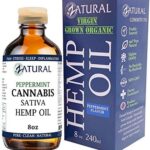
The oil pressed from the Hemp seeds contains the highest concentration of essential fatty acids (Omega 6, Omega 3 and GLA) of any all natural plant source. There is increasing scientific evidence that Omega 3 and Omega 6 polyunsaturated fatty acids may play important roles in animals with conditions such as:
-
pruritic skin disease
-
atopic dermatitis
-
allergies
-
degenerative joint disease
-
neoplasia
-
thromboembolic disease
-
eosinophilic granuloma
The good fats in Hemp seed oil is truly unique. Approximately 80% is polyunsaturated fat – the highest of any vegetable oil. Specifically, it contains the Essential Fatty Acids (EFAs) Linoleic Acid (Omega 6) and Alpha Linolenic Acid (Omega 3) in an ideal ratio for absorption by the body. These EFAs, considered good fats, cannot be produced by the body and therefore must be obtained from our diets. Hemp seed oil also contains Gamma Linolenic Acid (GLA), from which Omega 6 is naturally converted. Diets and sluggish enzyme activity often impair this conversion and cause GLA deficiency. Hemp seed oil solves this problem. No other single source oil has this ideal combination of EFAs.
Omega 6 (Linoleic Acid) and Omega 3 (Alpha Linolenic Acid) work together within the body. They are converted via enzymes through a chain of events to produce prostaglandins.
Potential Animal Applications
There is increasing scientific evidence that Omega 3 and Omega 6 Polyunsaturated Fatty Acids also play important roles in animals with conditions such as pruritic skin disease, atopic dermatitis, allergies, degenerative joint disease, neoplasia, thromboembolic disease and eosinophilic granuloma complex.
FACT: Studies to date have been done using flax, evening primrose oil and fish oil with mixed results. Study design has also been a problem with many lacking placebo control groups. In general, studies using a combination of evening primrose and fish oil (GLA and Omega 3) showed the most promising results. As we know, Omega 3 and 6 work in combination with in the body and an excess of one can lead to a depletion of the other. This can occur with using fish or flax oil exclusively. Long term supplementation with omega-3 may lead to a deficiency of omega-6 and reduce the anti-inflammatory potential of Linoleic Acid and its metabolites. Further, high doses of Omega 3 may also alter platelet function to the extent that hemostasis is impaired with significant increases in bleeding times. Likewise, excessive doses of omega-6 can lead to a depletion of omega-3 and its beneficial effects.
This area deserves a great deal of further research. Questions to be answered include: what is the normal ratio of essential fatty acids stored within the body of the animal and what is the ideal ratio of a supplement? What we do know is that Omega 6 and Omega 3 are required by every cell for proper functioning. We also know that Hemp contains a well-balanced ratio of Omega 6 to Omega 3 and it also contains GLA.
The introduction of polyunsaturated fats into pet food has developed considerable interest in the last few years. The problem being that these fats are inherently unstable and the food becomes rancid quite quickly. This is especially true of flax. Some foods have used marine or fish products and here the problem lies in potential heavy metal toxicity. Hemp would be an excellent addition to pet food based on its high levels of antioxidants thereby providing a natural preservative and a balanced omega-6 : omega-3 ratio.
Hemp Seed Oil has great potential in the animal industry. Immediate applications include the addition of Hemp pellets or the ground hemp meal and its protein into animal food/concentrates and the oil as a supplement. Future areas of research and application need to involve clinical trials and specific essential fatty acid research in the animal model.
Call direct wholesale prices and ask about our volume sizes for your animals 888-265-0811
References :
Bauer, J.E., ” The Potential for dietary polyunsaturated fatty acid supplements in domestic animals,” Aust. Vet. J.1994 71,342-345.
Bond, R., et al, ” A double-blind comparison of olive oil and a combination of evening primrose oil and fish oil in the management of canine atopy,” Vet Rec 1992 Dec 12;131(24):558-60.
Bright et al, “The effects of n-3 fatty acid supplementation on bleeding time, plasma fatty acid composition, and in vitro platelet aggregation in cats,” J. Vet. Internal Med 1994 8,247-252.
Campbell, K., et al, “Clinical use of fatty acid supplements in dogs,” Veterinary Dermatology 1993 4,167-173. Harvey, R.G. “Effect of varying proportions of evening primrose oil and fish oil on cats with crusting dermatosis (military dermatitis),” Vet Rec 1993 Aug 28;133(9):208-11.
Harvey, R.G. “A blinded, placebo-controlled study of the efficacy of borage seed oil and fish oil in the management of canine atopy,” Vet Rec 1999 Apr 10;144(15):405-7.
Olivry, T., et al, “The ACVD task force on canine atopic dermatitis (XXIII): are essential fatty acids effective?” Vet Immunol Immunopathol 2001 Sept 20;81(3-4):347-62.
Rees, C.A., et al, “Effects of dietary flax seed and sunflower seed supplementation on normal canine serum polyunsaturated fatty acids and skin and hair coat condition scores”, Vet Dermatol. 2001 Apr 12(2):111-7.
Ziboh, V.A., Lipid metabolism, inflammatory mediator pathways, dietary intervention with Omega 6 fatty acids, Proceedings of the 13th Veterinary Medical Forum, American College of Veterinary Internal Medicine, pp 456-460.
http://www.hempsa.co.za/Uses/Animal/HempForAnimals.htm









